When it comes to buying or selling a home, getting familiar with the world of real estate can feel both exciting and a bit overwhelming. One important thing to understand is the difference between a listing agent vs. selling agent.
These two types of agents play key roles in the process, but their jobs are often confused because they are closely related. Whether you’re buying your first home, selling a property, or just exploring your options in real estate, knowing how these agents differ can help you make better decisions.
Apart from what realtors do generally, in this article, we’ll explain what a listing agent vs. selling agent does, talk about their advantages and disadvantages, and give tips on choosing the right one for your needs. But first, let’s discover what each agent does.
What is a Listing Agent?
A listing agent is a real estate expert who helps homeowners sell their homes. When you decide to put your house on the market, a listing agent works with you throughout the entire selling process to ensure everything goes smoothly and successfully.
In the comparison of listing agent vs. selling agent, the listing agent’s main focus is representing the seller. They start by helping you determine the best price for your home based on current market trends and similar properties nearby. They also create a marketing plan to showcase your property, using online listings, photos, videos, and open houses to attract buyers.
Additionally, a listing agent manages property showings, highlighting your home’s best features to potential buyers. When offers come in, they negotiate on your behalf to get the best possible price and terms. They also assist with paperwork and guide you through the final closing steps to complete the sale.
Now, let’s take a closer look at what a listing agent does to help you sell your home:
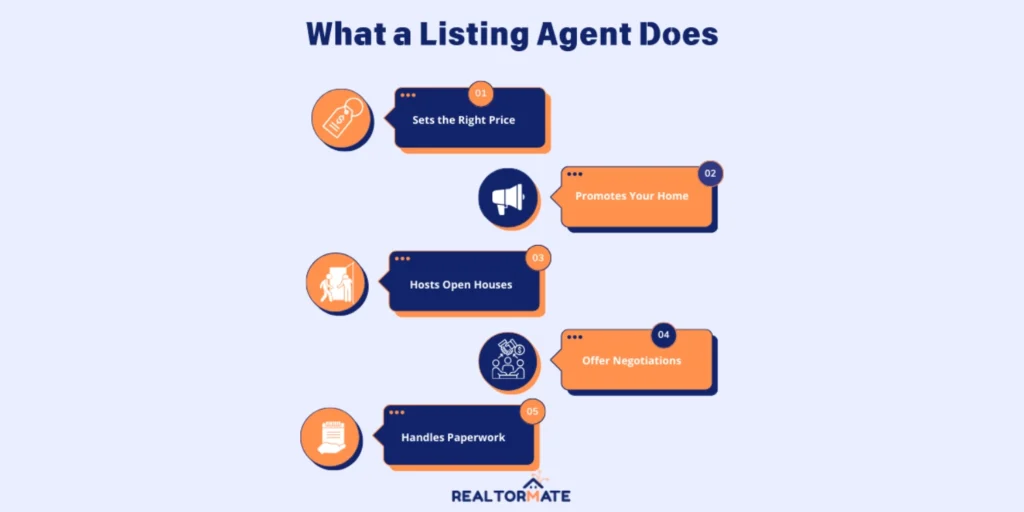
- Sets the Right Price: A listing agent researches the local housing market to figure out a fair and competitive price for your home. Pricing it just right is key to attracting buyers quickly while still getting good value for your property.
- Promotes Your Home: They create eye-catching listings with clear photos and detailed descriptions of your home’s best features. Using online platforms, social media, and traditional methods like open houses, they ensure your home reaches as many potential buyers as possible.
- Hosts Open Houses: Listing agents organize and host open houses, inviting potential buyers to view your home in person. Open houses are a great way to create interest and give buyers a closer look at what makes your home special.
- Offer Negotiations: When buyers make offers, the listing agent helps you review and understand them. They use their experience to negotiate on your behalf, working to get you the best price and terms for your sale.
- Handles Paperwork: Selling a home involves a lot of forms and legal documents. Your listing agent manages all the paperwork, ensuring everything is done correctly and on time to make the
process easier for you.
In the discussion between listing agent vs. selling agent, a listing agent is the expert who represents the seller and handles all the steps needed to sell a home successfully.
Advantages of Working with a Listing Agent
Working with a listing agent offers valuable benefits when selling your home. Their expertise in pricing and marketing can help you attract more buyers and achieve the best possible sale price.
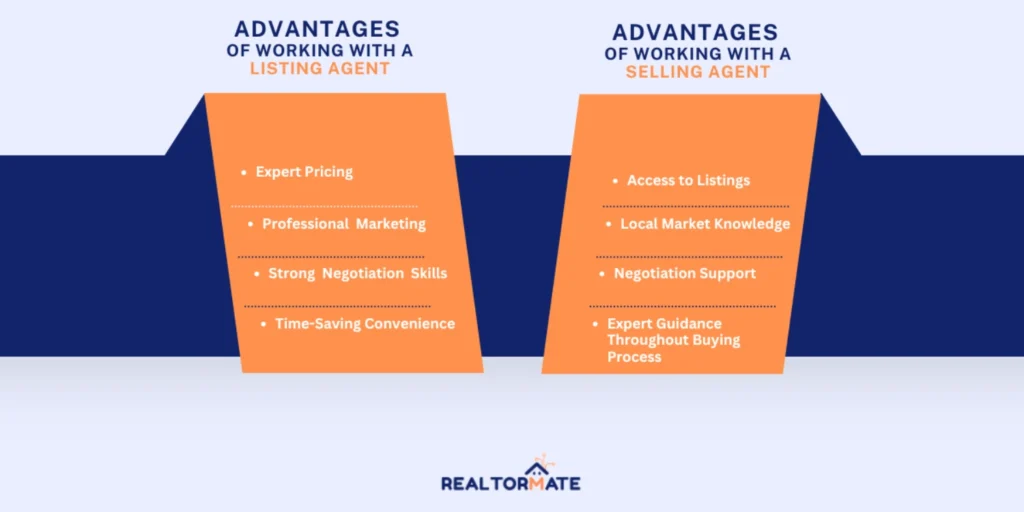
- Expert Pricing: Listing agents have extensive knowledge of local markets and can price your home competitively based on recent sales data.
- Professional Marketing: They know how to create eye-catching listings that highlight your home’s best features, attracting more potential buyers.
- Strong Negotiation Skills: Experienced listing agents are skilled negotiators who can help you get top dollar for your property.
- Time-Saving Convenience: By handling showings and paperwork, listing agents save you time and reduce stress during the selling process.
What is a Selling Agent?
If you’re in the market to buy a home, you may be wondering who can help you through the process. This is where a selling agent, also known as a buyer’s agent, comes in. A selling agent is a real estate professional who works specifically for buyers like you. Their job is to help you find the perfect home that fits your needs and budget.
A selling agent will guide you through every step of buying a home. They start by understanding what you’re looking for and then help you search for homes that match your criteria. They provide valuable advice and show you different options, whether it’s a cozy apartment or a large family house. Once you find a home you like, a selling agent will help you make an offer and negotiate the price with the seller.
They aim to get you the best deal possible, making sure you’re paying a fair price for the property. They also help you handle any paperwork, ensuring everything is in order for a smooth closing process and understanding the difference between selling agent vs listing agent is key when navigating the real estate market.
Here’s a more specific look at what a selling agent does:
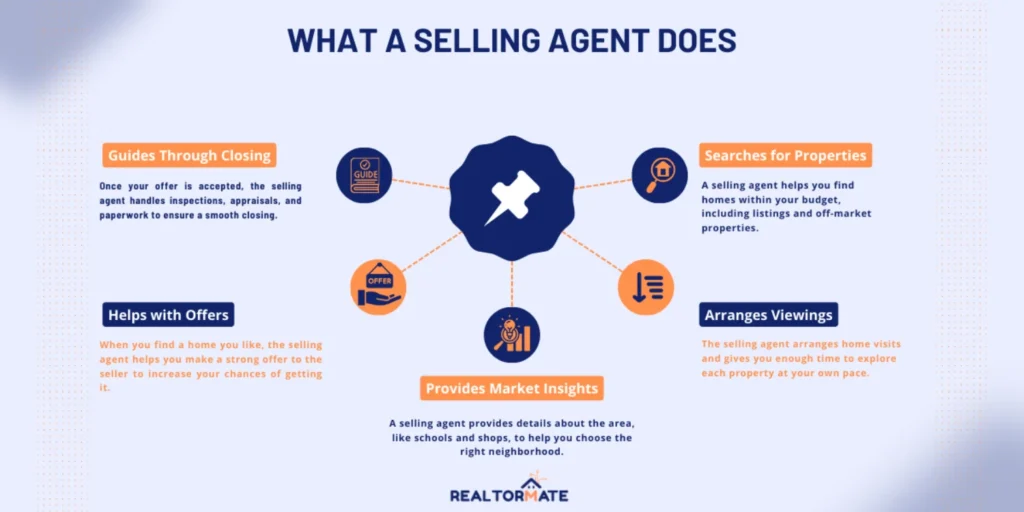
- Searches for Properties: A selling agent looks for homes that fit your needs and budget. This includes checking available listings and even finding properties that aren’t yet on the market.
- Arranges Viewings: When you’re interested in a home, the selling agent schedules appointments for you to visit. They ensure you have plenty of time to explore each property and make thoughtful decisions without feeling rushed.
- Provides Market Insights: A selling agent gives you helpful information about the area you’re interested in, such as nearby schools, shops, and other important places. This helps you make better decisions about which neighborhood is the best fit for you.
- Helps with Offers: When you find a home you like, the selling agent helps you make an offer to the seller. They make sure your offer stands out and is attractive to the seller, giving you the best chance to get the home.
- Guides Through Closing: After your offer is accepted, the selling agent helps you with the final steps of buying the home. This includes arranging inspections, ratings, and taking care of all the paperwork, making sure everything goes smoothly until the deal is complete.
Advantages of Working with a Selling Agent
Partnering with a selling agent brings valuable benefits when searching for a new home. They use their knowledge and experience to help you find the perfect property and navigate the buying process with ease.
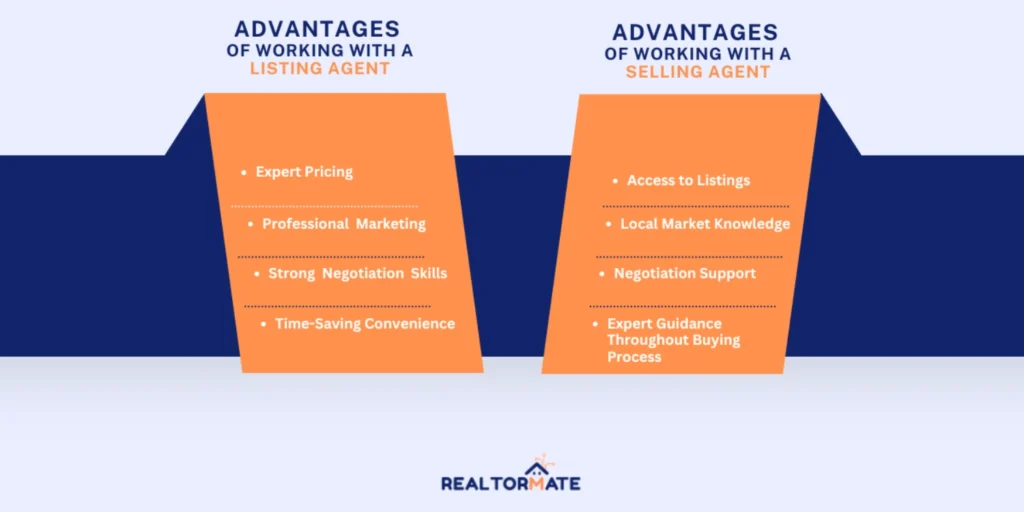
- Access to Listings: Selling agents have access to multiple listings, meaning they can find homes that fit your criteria quickly.
- Local Market Knowledge: They understand local trends and can guide you toward neighborhoods that suit your lifestyle and budget.
- Negotiation Support: Selling agents help buyers make strong offers and negotiate terms that work in their favor.
- Expert Guidance Throughout Buying Process: From start to finish, they provide support and advice during every step of purchasing a home.
Potential Drawbacks to Consider
While both listing agents and selling agents offer valuable services, there are some drawbacks:
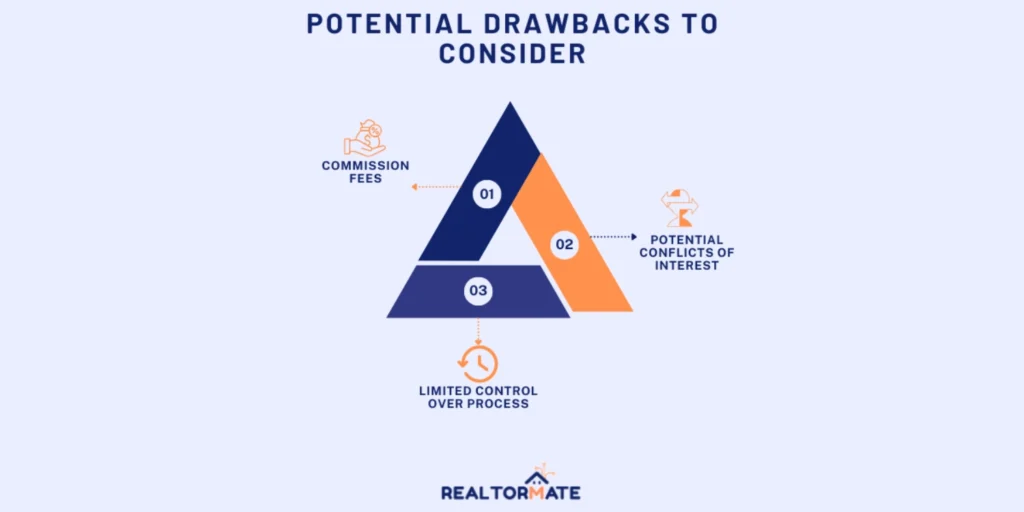
- Commission Fees: Both types of agents typically charge commission fees based on the sale price of the home, which can be significant costs for sellers or buyers.
- Potential Conflicts of Interest: In some cases, an agent might represent both the buyer and seller in one transaction (known as dual agency). This could lead to conflicts regarding whose interests come first.
- Limited Control Over Process: Working with an agent means relying on their expertise; sometimes their approach may not align perfectly with your preferences or expectations.
Listing Agent vs. Selling Agent: Key Differences
The main difference between a listing agent vs. selling agent is who they work for in a real estate deal. A listing agent works for the seller to help them sell their home, while a selling agent works for the buyer to help them find and buy a home.
- A listing agent represents the seller of the property.
- A selling agent represents the buyer of the property.
This fundamental difference shapes their roles and responsibilities during the buying or selling process.
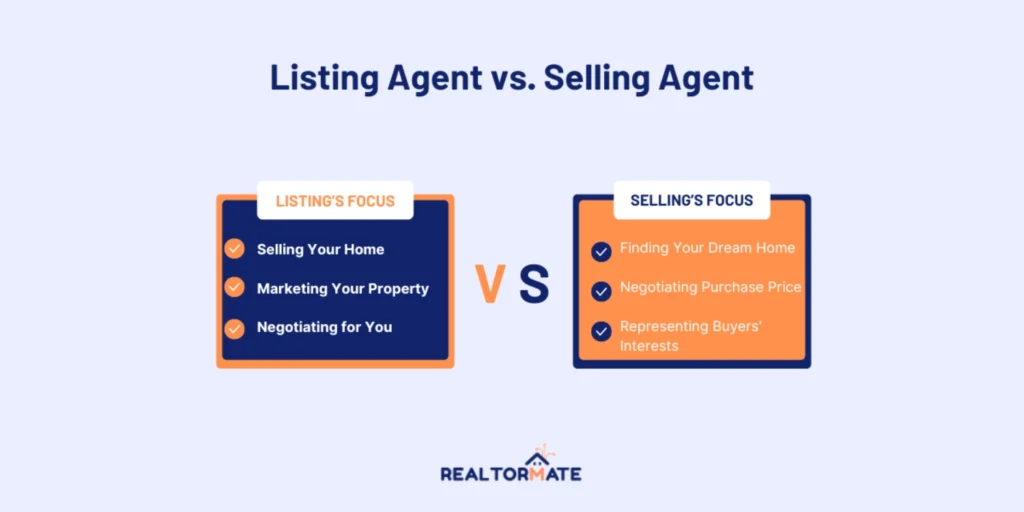
Listing Agent’s Focus
- Selling Your Home: Their main goal is to sell your home at the highest possible price.
- Marketing Your Property: They create effective strategies to showcase your home and attract potential buyers.
- Negotiating for You: They handle the negotiations, ensuring that the offers you receive work in your favor as the seller.
Selling Agent’s Focus
- Finding Your Dream Home: Their main goal is to help buyers find homes that meet their needs.
- Negotiating Purchase Prices: They try their best to get their clients the best possible deal when making an offer.
- Representing Buyers’ Interests: They advocate for their clients throughout the buying process.
Does Everyone Need a Listing Agent to Sell Their House?
When it comes to selling a house, many homeowners wonder if they really need a listing agent. While hiring an agent can provide valuable expertise and support, selling without one is also an option. Here are some pros and cons of selling a house without an agent.
Pros of Selling Without an Agent
- Cost Savings: One of the biggest advantages of selling your home without a listing agent is saving on commission fees, which typically range from 2% to 3% of the sale price. This can mean significant savings for sellers.
- Control Over the Process: Selling your home yourself gives you full control over the entire process, including setting the price, scheduling viewings, and marketing the property. This flexibility allows you to tailor the sale to your preferences.
- Local Knowledge: As a homeowner, you have firsthand knowledge of your neighborhood and property, which can be appealing to potential buyers. You can highlight local amenities and features that may not be as obvious to an outsider.
Cons of Selling Without an Agent
- Lack of Expertise: Selling a home is complex, and without an agent’s experience, you may struggle with pricing, marketing, and negotiations. Statistics show that homes sold by owners often sell for less than those represented by agents due to lack of market knowledge.
- Time-Consuming: Managing all aspects of the sale can be time-consuming. From marketing your home to handling inquiries and conducting showings, the process requires significant effort and dedication.
- Limited Marketing Reach: Real estate agents have access to multiple listing services (MLS) and other marketing channels that can attract more potential buyers. Without this exposure, your home may not reach as wide an audience.
Does Everyone Need a Selling Agent to Buy a House?
When considering whether to hire a selling agent to buy a house, it’s essential to weigh the pros and cons. While many buyers choose to work with an agent, it is possible to purchase a home without one.
Pros of Buying Without a Selling Agent
- Cost Savings: One of the main advantages of not using a selling agent is the potential to save on commission fees, which typically range around 3% of the sale price. This can lead to significant savings, especially in a competitive market.
- Direct Communication: Without an agent, you can negotiate directly with the seller or their agent. This can streamline communication and potentially speed up the buying process.
- Control Over the Process: Buying without an agent allows you to set your own search criteria and negotiate terms that suit your needs. This independence can be appealing for confident buyers who are familiar with the market.
Cons of Buying Without a Selling Agent
- Lack of Expertise: Without an agent’s knowledge, you may miss out on valuable advice and insights about the local market. This could lead to overpaying for a property or missing important details during negotiations.
- Increased Workload: You will need to handle all aspects of the buying process yourself, including researching properties, scheduling viewings, and managing paperwork. This can be time-consuming and overwhelming for many buyers.
- Legal Risks: Without professional representation, you may face legal challenges if issues arise during the transaction. Agents help navigate paperwork and ensure that all legal requirements are met, reducing the risk of mistakes that could have serious consequences.
Choosing the Right Agent for You
Choosing between a listing agent or a selling agent depends on whether you’re buying or selling a home—but finding the right person is crucial either way! Here are some tips:
1. Research Their Experience: Look for agents with proven track records in your area who have successfully helped clients buy or sell homes similar to yours.

2. Ask for References: Don’t hesitate to ask agents for references from past clients so you can learn about their experiences working together.

3. Local Knowledge Matters: Make sure they know your neighborhood well; this is especially important if you’re looking for specific amenities or schools nearby.

4. Comfortable Communication Is Key: Choose an agent with whom you feel comfortable discussing your needs openly; good communication can make all the difference!

Conclusion
Understanding the difference between a listing agent vs. selling agent is essential when navigating real estate transactions. Whether you’re selling your current home or searching for a new one, understanding the roles of each agent can greatly simplify the process.
FAQs
1. Can the Same Agent Act as Both a Listing and Selling Agent?
Yes, the same agent can act as both the listing and selling agent, a situation known as dual agency. However, this requires full disclosure and consent from both parties.
2. What Is a Selling Agent also Known as?
a real estate agent can have different titles based on their role in the transaction. If they represent the seller, they might be called a listing agent or seller’s agent. On the other hand, if they work with the buyer, they are often referred to as a buyer’s agent or selling agent.
3. What Is the Difference Between Listing Price and Selling Price?
In simple terms, the listing price is the amount the seller wants for their business. The selling price is the amount the buyer is willing to pay to buy it.
4. How Do Listing and Selling Agents Get Paid?
Listing and selling agents typically get paid through a commission, which is a percentage of the property’s sale price. This commission is usually split between the two agents and is paid by the seller after the transaction is completed.
